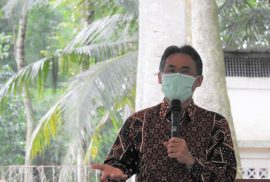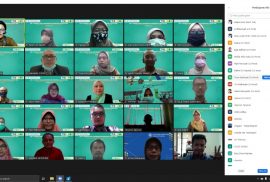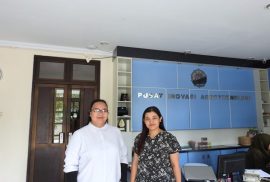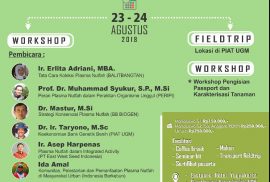The dairy industry in Indonesia is growing, marked by the increase in processed milk-based products on the market. This has caused many milk producers to continue to increase production and build new factories in Indonesia. One of them is PT So Good Food Indonesia, which has developed Real Good Milk since 2013 in Boyolali Regency by collaborating with the Indonesian Milk Cooperative Association (GKSI) in the Central Java region to ensure the availability of fresh milk. This product diversification is one of the strategies to increase the added value of the company, but on the other hand it creates new homework related to the management of the waste produced.
Uncategorized
As a supporting unit of Universitas Gadjah Mada (UGM), PIAT, which has been operating since 1975, is now growing. Located in the middle of a residential area of Tanjungtirto Village, Kalitirto, Berbah, Sleman, PIAT UGM starts 2021 by holding a meeting with Tanjungtirto residents. The meeting is a manifestation of gratitude to the Tanjungtirto residents for supporting PIAT’s operational activities thus far. It is also a means of discussion to listen to complaints and suggestions from the locals.Previously, UGM had first distributed 300 packages of food supplements, honey, and eggs on 3 January 2021 for the residents. Drs. Gugup Kismono, M.B.A., Ph.D. as the Rector’s Secretary was in charge to symbolically hand over the donation package.
The Center of Agrotechnology Universitas Gadjah Mada (PIAT UGM) held the international conference again on Thursday (3/12). The conference was entitled The 1st International Conference of Industrial Agriculture (ICONIA) which carried the theme Managing Crisis in Industrial Agriculture: Way Forward. This event was held in one day, and involving four partners of higher educational institution which are Gardening Polytechnic LPP of Yogyakarta, Janabadra University, Universitas Pembangunan Nasional “Veteran” Yogyakarta (UPNVY), and Sarjanawiyata Tamansiswa University.
The Center for Agrotechnology Innovation (PIAT) UGM again received a visit on Monday (9/3). The visit was from representatives of the Subang Saemaul Indonesia Globalization Foundation (YGSI) Chapter. This foundation is a non-profit organization based in the UGM Faculty of Philosophy with an orientation towards community empowerment. The foundation is engaged by getting funding from the Saemaul Globalization Foundation, South Korea.
The morning visit was carried out by directly visiting and learning about maggot cultivation and waste processing at the Recycling Innovation House (Rindu). Later, maggot which is a larval type of maggot from the Black Soldier Fly (BSF) flies became the new belle. This stems from research findings that reveal that maggot has a high protein source so that its prestige is on the rise among farmers and among the public. This is also part of the background for YGSI’s visits.
Genetic resources are national assets of each country. Based on the Convention on Biological Diversity in Rio de Janeiro, Brazil in 1992, genetic resources were no longer the world’s wealth. Everyone cannot explore and demand ownership rights or even use genetic resources freely. In line with the steps to realize the Sustainable Development Goals, these genetic resources need to be kept either in-situ or ex-situ way and if genetic resources are orthodox seeds, then genetic resources can be stored in the form of genetic banks.





